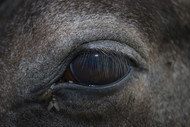Horses & Fly Nuisance
Posted by Darren Walton on 5th Aug 2021
Horses & Fly Nuisance
There are a number of flies which affect horses; midges, black fly, bot fly, horse fly, crab fly as well as stable and house fly. These flies can either cause problems by being nuisance surface feeders – found generally around the eyes and mouth where secretions are produced; or biting flies which possess mouth parts which puncture the skin, or in the case of horse flies even slash the skin surface.
Generally flies will lay their eggs in organic substances e.g. faeces. As such it is important to ensure that paddocks are kept free of dung where possible and that your dung heap is located as far away from stables as practical, whilst also being as far from the paddock areas as possible. Stagnant water should be drained as this is the perfect breeding ground for midge. Midge can be a particular problem as their bites can cause an allergic reaction in some horses known as Sweet Itch. See our how to treat for Sweet Itch blog post for more information.
There are a number of ways to help your horse during fly season ranging from masks and rugs to spray on repellents or insecticides for horses.
Preventing the flying insect from biting the horse in the first place is perhaps the best form of defence. A good quality, well-fitting fly rug will cover most of the horse including problem areas such as the mane, tail base as well as the belly. The materials these rugs are made from are fine fitting enough to prevent the flies from biting but perforated enough to allow heat evaporation. Teamed with a suitable fly mask which may also include ear and nose covers if required should help protect almost the entire horse from fly nuisance.
However, not all horses will tolerate the use of rugs and masks, in which case it may be necessary to protect your horse by means of an insecticide or fly repellent for horses . There are many options available in terms of brand as well as form; ranging from insect and fly collars for horses, to creams and gels such as Leovet Durativ as well as more traditional fly sprays for horses such as the Barrier Super Plus and Leovet Power Phaser fly sprays. These products vary in duration of action and may need reapplication within hours, though some of the insecticidal products can last up to a full month e.g. Deosect. It is important to note the difference between a repellent and an insecticide. A repellent will only repel insects, whereas an insecticide will kill the flies on contact. The advantage of an insecticide is that not only does it usually remain effective for a much longer period of time, but by killing the insects it will actually reduce the local fly population over time as more and more of the flying insects are killed – therefore reducing the fly challenge faced by your horse.
For more delicate areas or horses that are ‘head-shy’ when it comes to the application of a spray formula there are a number of gels/creams available. Battles Summer Fly Cream is not only an effective repellent cream but also has soothing properties to help relieve the irritation.
When it comes to controlling the local fly population particularly around the stable and yard area there are a number of useful products available for catching flies. The most popular and effective is the Red Top Fly Trap which can trap up to 20,000 flies. This is designed to be hung outside the building to attract flies out of the stable. The product requires UV so should be hung in direct sunlight to maximum effect. The bait will last 4-6 weeks and is particularly attractive to female flies, further reducing the population.
Supplementing your horses diet can also help with fly nuisance. These are available as licks, feed supplements and even in treat form. Products such as Cavalesse are used at a rate of only 3ml per day. Cavalesse contains Nicotinamide, which reduces the body’s production of histamine as well as improving the skins natural barrier by increasing the amount of natural fats on the skin surface. Think Fly supplement contains a herbal fly dispersant, rich in herbs, essential oils, MSM, Zinc and trace elements this horse supplement helps to promote a healthy skin and coat.

